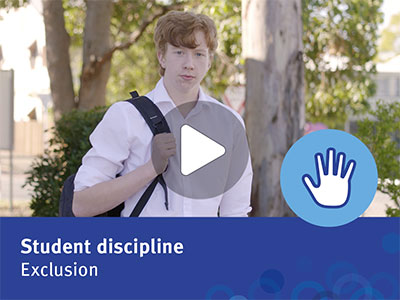
Exclusion is the most serious disciplinary action that can be imposed on a student and must only be used if other disciplinary consequences are inadequate to deal with the student’s behaviour. A school’s
Student Code of Conduct includes the school’s expectations about behaviour and it outlines a range of consequences, such as exclusion, that may be used to respond to inappropriate behaviour.
Principals can also make a referral to the Director-General to exclude a student from certain or all Queensland state schools, however, the Director-General is the only individual with the authority to exclude students from certain state schools in a particular area or region or all state schools in Queensland.
Each of the following is a ground for exclusion under the
Education (General Provisions) Act 2006:
- persistent disobedience
- misbehaviour
- conduct that adversely affects, or is likely to adversely affect, other students
- conduct that adversely affects, or is likely to adversely affect, the good order and management of the school
- the student’s attendance at the school poses an unacceptable risk to the safety or wellbeing of other students or of staff
- if suspension of the student is inadequate to deal with the disobedience, misbehaviour, conduct or risk.
It is also a ground for exclusion if the student has been convicted of an offence and the principal is reasonably satisfied it would not be in the best interests of other students or of staff for the student to be enrolled at the school.
For more information regarding exclusion in Queensland state schools, refer to the
fact sheet—exclusion (PDF, 527KB).
Video thumbnail image with text "Student discipline: exclusion".

Transcript (DOCX, 117KB)